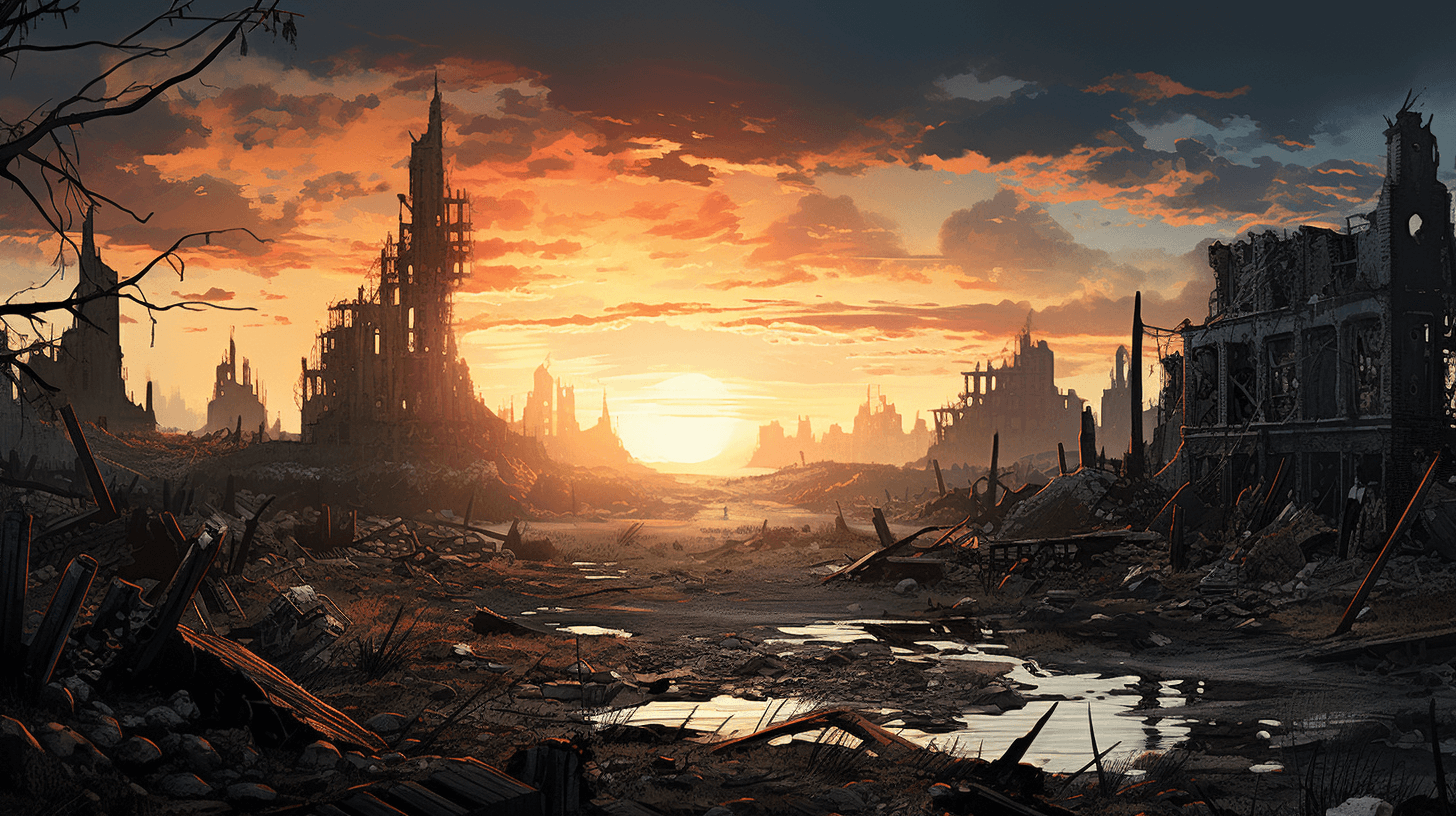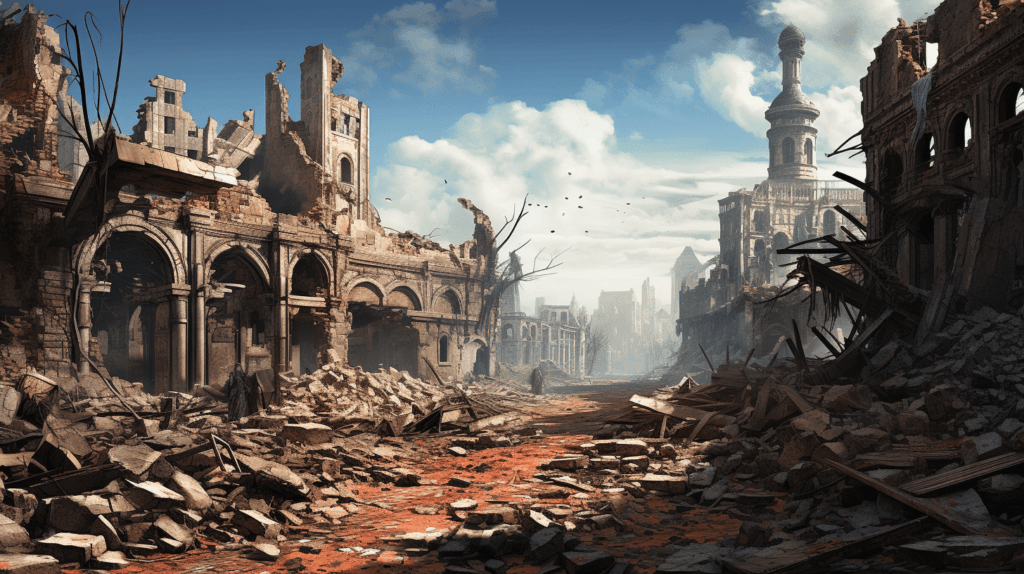Science
How Did Life Rebound on Earth? The Answer Lies Within the Rocks
23 February 2026

Energy acquisition through atomic fission, jet planes, high-speed helicopters, and of course, submarines, tanks, and state-of-the-art means of communication. Some scholars attribute these and other significant innovations to war. They posit that armed conflicts have historically spurred ingenuity and propelled economic growth. But is this truly the case?
It’s hard to argue that wars waged over the centuries often served as practical testing grounds for the introduction of new technologies. The brightest minds of their eras endeavored to bolster their military effort, aiming to repel invading forces in an effective fashion. The easiest tactic was to use a ploy or an innovation unknown to the enemy. For instance, about 3,500 years ago, the Egyptian light chariot was developed—very mobile on account of its wheels. Similarly, in the 9th century A.D., the Chinese introduced the devastating potential of gunpowder, and later on firearms (which were initially viewed as dishonorable weapons). Over the centuries, cannons and rifles evolved, and to counter their destructive power, advanced communication tools, like radar, were devised to track enemy movements.
But did the resourcefulness of engineers, forced by the brutal confrontations of armies across the battlefields of the world, truly lead to accelerated economic growth—especially after World War II—and consequently, to an improved well-being of the population? After all, rebuilding the infrastructure of war-torn cities required employing millions of people, resulting in a significant surge in demand. Are we sure though that it also meant facilitating economic growth? Even if it did in the short term, when you look at the events from a broader perspective, the answer is no. The assertion that war inherently benefits development is questionable at best.
Some researchers point to post-war Germany as a perfect example of the potential positive effects of armed conflicts. The period from 1939 to 1945 was obviously marked by unparalleled atrocities. Millions of people from various nations perished. Hundreds of cities and production facilities were razed to the ground. Yet, in the ensuing decades, the Federal Republic of Germany witnessed remarkable economic growth. One of the reasons behind it—besides the necessity of rebuilding the country—was the opportunity to build more advanced and efficient manufacturing plants. You could compare this to building a new home instead of completely renovating an old building, and evaluate the costs in both instances. The former is usually the cheaper option, with the added advantage of implementing up-to-date solutions (including energy-efficient technologies).
No less than for Germany, World War II was also beneficial for the United States. A surge in public investments became the driving force of the American economy, and the country became an undisputed world leader (at the expense of the former global powers—Great Britain and France—which lost their colonies and most of their overseas properties). So maybe the war did boost economic growth after all?

The writers at the prostaekonomia.pl blog argue that the myth of war-triggered benefits is just another version of the parable of the broken window. The concept was conceived by 19th-century French economist, an advocate for the free market and a critic of socialism, Claude-Frédéric Bastiat. He came up with a story of a townsman, named James Goodfellow, whose underage son broke a window pane. When the dismayed father lamented that a new window would cost him as much as six francs, someone from the onlooking crowd protested and said that there was nothing wrong with that, because the broken pane became the opportunity for the glazer to make a profit (otherwise he wouldn’t be hired to fix the window). The glazer then would spend the earned money somewhere else, e.g., at the inn, and the innkeeper would in turn buy from the nearby merchant, and so on, and this would boost the local economy. Following this logic, one could absurdly argue that the boy did nothing wrong—on the contrary, he supported local commerce.
Bastiat conducted a thorough analysis of the problem. From James Goodfellow’s point of view, the situation looked like this: he initially had six francs, and a window pane. After the mishap, he had only a new window pane bought with the money he planned to spend on new shoes. Thus, in reality there was no genuine “economic boost,” the gain of the glazer mirrored the loss of the shoemaker.
American journalist and economist Henry Stuart Hazlitt claims that similar fallacies are very common. For instance, when news analysts assert that damages caused by a flood will invigorate the construction sector, they overlook the fact that prosperity in one industry translates into depression in another one. According to Hazlitt, misconceptions of this type appear because people often fixate on the immediate ramifications of an event, neglecting its broader, indirect consequences.
One of the mistakes made by the proponents of the idea that war stimulates economic growth is the misuse of the term “demand” and equating it with societal needs. Effective demand factors in the purchasing power of the population and can’t adjust itself to the rising needs of the consumers. This is evident in post-war countries, struggling with goods and services shortages, or in the poverty-stricken so-called Third World countries. The needs are enormous; however, the lack of funds makes it impossible to supply those needs in a swift manner.
In other words, economically devastated post-war societies can stimulate demand only to a limited extent, as they lack the capital (demand can often be encouraged by the so-called recovery programs, like the Marshall Plan enacted after World War II). But what would have happened if the war had been averted and financial resources of the populace had not been plundered? What if Poland, in 1945, had assets comparable to those it had in 1939? Wouldn’t that elevate the country to a higher development level? Those seem like rhetorical questions. Warsaw can serve as a perfect illustration to compare a city before it was ravaged by the war, and after. Which Warsaw would have been easier to modernize? The one with beautiful tenement houses, worthy of her “Paris of the East” moniker? Or the ruins visible in photographs dating from 1945?
Another mistake associated with the economic interpretation of war is the misreading of statistics. Pointing to increased money supply after the end of a military conflict leaves increased levels of inflation that usually accompany any war (the government prints more money to cover the costs of arming the military forces) out of the equation. The volume of money in circulation does grow; however, that money is worth less and less. Therefore, the well-being of the society decreases.
Supporters of the “war is good for economy” argument repeatedly mistake vested interest of a single branch of business or services with the interest of the whole society. While entities from select sectors of the economy might prosper after the conflict winds down (construction, automobile, and household product industries), others might find themselves less fortunate. Increased demand for particular products results from their scarcity (or exorbitant prices) during the time of war. Consumers are essentially catching up on their purchases. Had the peace remained uninterrupted by war, they would have continued buying products, paying for services, or investing money. The total value of any goods accumulated by the people would likely be greater if there was no “war gap.”
Alluding to any supposed advantages of building “the new in the place of the old” sounds peculiar at best. The argument would imply that bombing cities in Poland, Germany and Japan during World War II created better conditions for economic enhancement. That the destruction of the old and obsolete factories allowed for the renovation of infrastructure, which made it more competitive, while at the same time, the rivals from the neighboring countries, not involved in the conflict, lagged behind with their dated facilities.
To extend this argument to its logical conclusion: if obliterating the infrastructure was so beneficial for economic growth, why didn’t the Americans and British bombard their own cities, so they could build them anew? This line of thought completely ignores the advantages of having functional factories in a time where some of the others were turned into a pile of rubble. Furthermore, this destruction stripped the owners of the vital capital required for reconstruction (or modernization). So, if war robbed people both of their property and capital, how beneficial really was it? Not much, by any measure. At best—there might be savings on demolition expenses. Bearing this in mind, it’s hard to see the supposed positive effects of war-induced devastation.
The ravages of war repeatedly have been the subject of macroeconomic studies. Zsóka Kóczán and Maxim Chupilkin—experts from the European Bank for Reconstruction and Development (EBRD)— surveyed data on over 400 armed conflicts from the past 200 years. They pointed to destruction of human and physical capital, disruptions to production processes, and heightened uncertainty among consumers and producers as the most significant effects of war from the economic perspective. While they did notice that an armed conflict can temporarily stimulate economic growth due to increased domestic military spending (which can drive heavy industry output), this growth rarely, if ever, translates into an improvement of the general population’s well-being, as it is not related to infrastructure development, for example the building of new roads and highways, or improving public services (like healthcare or education).
This pattern may be exemplified by Germany. Between 1934 and 1944, the country enjoyed an economic boom, which was fueled by the arms race as well as plundering of the territories occupied by the Third Reich. Increased government investment in the armaments industry led to a 40% rise in GDP in less than 10 years (averaging a 4% increase every year). However, the post-war German economy experienced a similarly impressive decline, with GDP returning to levels seen before the boom. Additionally, the war reduced Germany’s population by approximately 9%. (It wasn’t until the early 1950s that the population returned to its pre-war state.) To put it simply: when it comes to the economy, these were two wasted decades for the country.
The EBRD economists also observed that civil wars have a more detrimental impact on the economy than territorial disputes. There are several reasons for this: in local conflicts, predatory exploitation of external lands does not happen (everything occurs within the borders of the affected country), these conflicts usually last longer, and they more frequently remain unresolved. In consequence, the GDP per capita of the countries affected by civil wars falls harder than those engaged in cross-border clashes. For example, the dissolution of Yugoslavia and the subsequent war led to a 40% decline in GDP between the years 1989 and 1993, and the unemployment rate surpassed 20%. An even steeper economic decline was noted in Afghanistan, where—with brief interruptions—a civil war has persisted since 1989. Between 1986 and 1994, the country’s GDP per capita plummeted by a staggering 84%. This drop can only partially be attributed to the rapid growth of the local population, which doubled in size by 2005.
Other economic analyses draw attention to the relationship between economic cycle and military activity. In the case of armed conflicts after World War II, the U.S. engaged in warfare only during its own economic upturns (as evident in the Vietnam war, the Cold War in the 1980s, as well as interventions in Yugoslavia, Iraq, or Afghanistan). In times of economic downturns, the American powerhouse focused on domestic issues.
In conclusion, it’s essential to distinguish between two assessments of war, depending on specific circumstances. A state engaged in a war within its borders will invariably experience negative economic effects. For countries involved in the conflict but free of military operations on their own soil, war can have some positive financial and developmental effects. This is the only way you can accept the idea of “benefits of war.” Even then, those are only few and far between, and they should never overshadow the broader tragedy: the loss of human life, material destruction, and great economic setbacks in any region where combat operations continue to unfold.
Translated by Przemysław Kołodziej
Read more on Holistic News

Science
22 February 2026

Humanism
22 February 2026

Zmień tryb na ciemny